Stephen Schwartz's Career - part II
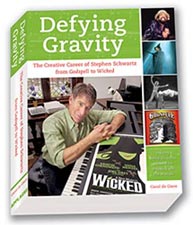 FOR MORE PHOTOS AND BACKGROUND ON STEPHEN SCHWARTZ, please check out the authorized biography Defying Gravity: The Creative Career of Stephen Schwartz, from Godspell to Wicked
FOR MORE PHOTOS AND BACKGROUND ON STEPHEN SCHWARTZ, please check out the authorized biography Defying Gravity: The Creative Career of Stephen Schwartz, from Godspell to Wicked
Stephen Schwartz: The Spark of Creation, Part II
by Peter Leavy
Part II - November 2002 issue Cabaret Scenes Magazine.
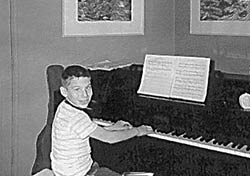 [Stephen creating the spark at age 7.]
[Stephen creating the spark at age 7.]
(In part one, we followed Stephen Schwartz's musical trail from Carnegie Mellon University, where, as a student, he wrote the early version of his later-to-be Broadway hit, Pippin, to his eminence as a composer and lyricist of stage, television and animated motion picture films. Hard work, luck, and a never ending search for improvement have been Stephen's touchstones. Musicals which started out poorly — The Baker's Wife initially closed out of town without ever reaching Broadway; Rags, with Stephen's lyrics and Charles Strouse's music, had gone dark after four performances; Working hardly did better, at twenty four performances — would be reworked and eventually come into their own.)
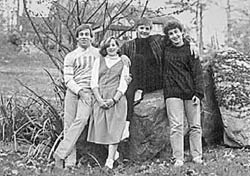 [Schwartz and Sweets: Stephen with Jessica, Carole and Scott in Connecticut.]
[Schwartz and Sweets: Stephen with Jessica, Carole and Scott in Connecticut.]
Stephen is very much a family man and seemed to enjoy relating the story of how he met his wife to be, Carole. "It was actually like Mickey and Judy.We were doing summer stock in New Hampshire at the New London Barn Playhouse. I was music director and doing some directing as well and she had come to play Gladys Bumps in Pal Joey. But then she went back to Michigan to do the lead in South Pacific somewhere or other. I tried to track her down but her maiden name was Piasecki and I didn't know how to spell it. I spent so long on the phone with the operator, but I never did get it right and never could find her." Obviously, however, the longing was mutual. His search had a happy ending when Carole called him.
In New York, shortly before they were married, Stephen continues, "Carole was one of three women in the cast of the original 1776, playing a doxy whom the Continental Army was neglecting their soldierly duties with. But when they shortened the show and cut it down to perform without an intermission, her whole scene got knocked out." Soon, raising a family put Carole on the mommy track and she became increasingly involved in the managerial side of Stephen's career. But, he says, "She's just started acting again, doing some readings, sometimes for our son, Scott."
[more about Scott Schwartz]
Scott may have inherited some of his dad's theatrical savoir faire, but observing his father's workaday efforts in putting together shows must certainly have helped. Stephen recalls his wife telephoning him in London some years back to say "she just had seen what our son was going to do for a living." She'd watched a comedy young Scott had directed in his school, and informed Stephen, "He's amazing. I don't know if he wants to yet, but it's what he's going to do." Scott's younger sister, Jessica — also the apple of Stephen's eye — has come to the entertainment world from a different direction.
Although Jessica professes a desire to teach, her career up to now has been in photography and design. Demonstrating her abilities, he displays the cover of his new CD, Uncharted Territory, and Scott Coulter's CD, Scott Coulter, which Jessica designed as well. [Editor's note from 2006: Several years ago Jessica became a school art teacher.]
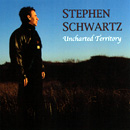 Uncharted Territory [new browser window]
Uncharted Territory [new browser window]
In addition to permitting him to bask in the glow of their accomplishments, the family is important to Stephen in other ways. They assist him in his creative tasks by providing feedback. As sounding boards, he says, "They're very, very smart, extremely objective, and at the same time I know they are completely on my side." Stephen's recent forays into cabaret as a performer as well as songwriter have gotten increasingly enjoyable for him as he's gotten more comfortable being in front of an audience.
Scott Coulter, one of his two usual showtime partners, has been a favorite of Stephen's ever since he heard him sing during an ASCAP workshop presentation of Marcy Heisler and Zina Goldrich's musical in progress. "I went to see one of Scott's shows at Don't Tell Mama. I thought he had an amazing voice. So when I was putting together Stephen Schwartz and Friends, I thought he would be a great choice. He's not only a great singer, but he sings very differently from the way I do." Debbie Gravitte is the third member of the small troupe. "I knew her from her Tony Award role in Jerome Robbins' Broadway. I saw her in Zorba. We all got together and we just clicked. It's a good combination, the three of us are very different but we get along really well."
It was interesting to hear Stephen declare that in his cabaret show, "I do discover things while playing. I found a much, much better arrangement for one of my songs by performing it live and I was sort of sorry I'd already recorded the songs because I discovered something that would have been a better way to do them." He mentioned another song he changed after performing it, one from his forthcoming musical, Wicked, based on the novel The Life and Times of the Wicked Witch of the West by Gregory Maguire.
Cabaret is a unique part of the music world to Stephen, and he maintains, "There is clearly an audience for it. Sometimes that audience is larger than other times but it never disappears entirely." He cites his own experience. "Scott Coulter, Debby Gravitte and I just played in Marlton, New Jersey. We'll be in Westport, Connecticut, then Arvada, Colorado, Platteville, Wisconsin, and in Aurora, Illinois. Sometimes the rooms are full, sometimes not so full. We did a show in Westhampton that was not well attended but the ones in Marlton and in Dallas were packed. I don't know why. You can't always predict."
Stephen Schwartz and Friends features Stephen's songs. If, traditionally, characters in Broadway or Hollywood musicals break into melody only loosely connected to the plot, Stephen's songs are more a part of the foundation and building blocks of the show than tuneful adornments.
Tom Moore, the director of Disney's made for television film, Geppetto, for which Stephen wrote most of the music, agrees. "Stephen is very instinctive about story points. His songs grow out of the material." But there is a danger of missing the depth and variety of his writing. On The ![]() Stephen Schwartz Album CD, for example, the selections from the animated films — Pocahontas, The Prince of Egypt, and The Hunchback of Notre Dame — are numbers that do not wholly rely on but certainly benefit from the context of the movies they are in. Stephen Schwartz Album
Stephen Schwartz Album CD, for example, the selections from the animated films — Pocahontas, The Prince of Egypt, and The Hunchback of Notre Dame — are numbers that do not wholly rely on but certainly benefit from the context of the movies they are in. Stephen Schwartz Album
In contrast, Meadowlark, from The Baker's Wife, is an allegory with the self contained story of a conflict between duty and desire, not dependent on the musical's plot. Fathers and Sons from Working depicts a universally complicated relationship that can be found as far back in literature as the Bible and Greek tragedy. Blame It On The Summer Night, from Rags, is an exquisite lyric poem with music by Charles Strouse, comparable in genre and theme to And When October Goes by Barry Manilow and Johnny Mercer. In both, the emotions in the songs are tied to seasons of the year, not to a narrative.
Stephen prefers to work on complete shows so his stand alone songs have been targeted to his two CDs, A Reluctant Pilgrim and the recent Uncharted Territory.
[Read more about Schwartz recordings]
The impetus to do singles is interesting. "My best friend is John Bucchino and I'd been encouraging John to write for the theater because I thought he had such a gift for lyrics and so many of his songs were so theatrical. He said to me, 'I'll think about doing that but how come you never write individual songs based on your own life, or your friends' lives, the way I do?' So we sort of challenged each other, and he started developing theater stuff and I started writing some individual songs. People heard a couple of mine at parties or wherever and began asking me for demos of them, so I started making demos. I thought 'as long as I'm going to all this difficulty, I might as well actually just do an album. I'll write some more songs to have an album's worth of material and just hand it out to people who want demos.'" Thus was his first album, Reluctant Pilgrim, conceived and created.
Stephen refuses to speculate on where his career will take him when Wicked is finalized. His experiences with Hollywood, where he did songs and/or lyrics for four animated films, were unanticipated. Although the Disney organization was seeking a composer with Broadway musical experience for its animated features, Stephen claims the opportunity came fortuitously when Alan Menken and he were doing a benefit performance together. Alan wondered if he would consider doing just lyrics. "I didn't even ask what the project was. I just asked, 'where do I sign?'"
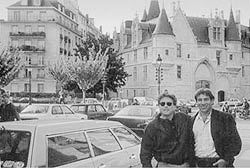 [That's not Notre Dame but it is Stephen (r) with composer Alan Menken in Paris.]
[That's not Notre Dame but it is Stephen (r) with composer Alan Menken in Paris.]
The pairing of Menken as composer and Stephen as lyricist, of course, was a winner. The film, Disney's Pocahontas, brought them two Academy Awards. It was followed in short order by a Menken/Schwartz collaboration on The Hunchback of Notre Dame, which received such an enthusiastic reception as an animated film that it was adapted as a Berlin live theater production, Der Glockner von Notre Dame, and has become Germany's longest running musical ever. Stephen captured yet another Academy Award for When You Believe from DreamWork's The Prince of Egypt. As Stephen says, "I've learned over the course of time that you can't predict the future. Things come out of the blue. So I go day by day and work on things that I'm interested in, but I don't have a long term plan."
Looking back over his career, which has brought Stephen awards and accolades as a composer and lyricist in musical theater, films, and television, is he content? "I've certainly had a great time. I would be surprised if any artist were content. I think the nature of being an artist or a creative person is discontent. There's always something niggling at you that's deep within you that will never be completely silenced. I think that when one is completely content, one stops working." Reflecting on what Stephen had told us in our long conversation, it seemed as if the secrets of his many successes might not be secrets at all, just common sense.
If he were to offer advice to others, we pondered, what might it be? Clearly, he would say, "Be yourself." He did remark, "You don't have to second guess yourself and think about the audience — what do they want to hear, what do they like? I just write for myself, whether I'm writing a personal song about myself or I'm writing from the point of view of the Hunchback of Notre Dame or the Wicked Witch of the West. Do it well enough, articulately enough, and it speaks to other people almost magically."
Then, very possibly, "Take chances." As he acknowledged in an interview with ASCAP, he likes to do things he hasn't done before. He grabbed at the possibility of doing lyrics to Alan Menken's score. And he decided to adapt Working by Studs Terkel after he'd gotten an announcement of the book in the mail from the Book of the Month club. "The idea immediately spoke to me as something theatrical, and thematically something I was interested in. I think I was about halfway through the book when I decided it was something I wanted to do." Stephen's thought was to utilize a variety of composers to give individual characters different voices. "I flew to Chicago and met with Studs Terkel. He went from thinking I was crazy to thinking it might be possible." When things look bleak, he'd probably admonish, "Keep working." Discouragement is part of the human condition.
Even Stephen, who was such a phenomenon early in his career, went through a difficult period, and would face numerous ups and downs. with those original successes, everything was coming up roses. He told an earlier interviewer, "I was catapulted into fame and prominence before I was ready emotionally at all. It wasn't even conscious, I just completely burned out." But after several years of what he termed "hiding out," the chance in 1981 to adapt Working for television re-energized him, and he hasn't slowed down since.
More recently, when he experienced a period of writer's block, John Bucchino offered a sound solution. "Just write, and don't care about how stupid or sloppy it is, then go back and edit it." Stephen concurs, "That was such good advice. It worked, and I still use it." "Be tenacious," he'd certainly advise. The Baker's Wife, and Rags both bombed the first time out. Working's poor initial showing on Broadway left Stephen very depressed. But all were re-thought and reworked until they found their footing and succeeded.
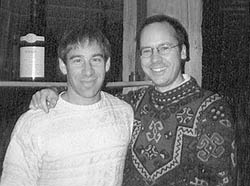 [Children of Eden: Stephen and John Caird.]
[Children of Eden: Stephen and John Caird.]
Even his most recent musical, Children of Eden, had its growing pains. He says of it, now, "I think that it's the most satisfying piece I've done. It's my favorite; I think it's my best score. It clearly represents my point of view in many ways in its philosophy. And I have great satisfaction that a very bumpy road led to a successful life, and in the perseverance involved in getting it to the place where it's thriving."
Steven's musical in progress, Wicked, characteristic of his thoroughness as much as the demands of the theater, has gone through seven readings so far and probably will have one more before it goes into rehearsal for its spring debut in San Francisco. Perhaps, most of all, Stephen would say "Understand that for everyone there must be a beginning." with three Academy Awards and two Grammys displayed on his proverbial mantle, if he has one, he still remembers how, as a young hopeful, "I came to New York not knowing anybody, or how to break into the business, and I just sat in my apartment on 72nd Street, looking out at the people on the street, thinking 'I'm just going to die up here, not having done anything, not even knowing how to try to do anything, while all these people seem to be going on with their busy lives.'" And then, he got the chance to write a song - on speculation - for a show called Butterflies Are Free. The rest, as they say, is (musical) history. END
FOR MORE PHOTOS AND BACKGROUND ON STEPHEN SCHWARTZ, please check out the full career biogrpahy Defying GravityDefying Gravity: The Creative Career of Stephen Schwartz, from Godspell to Wicked
Note: This article was originally published in Cabaret Scenes Magazine
